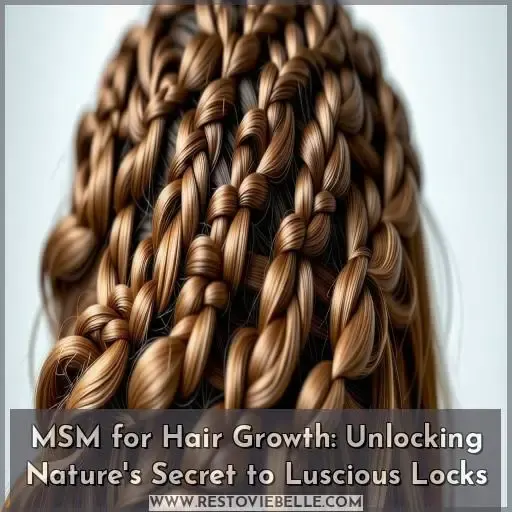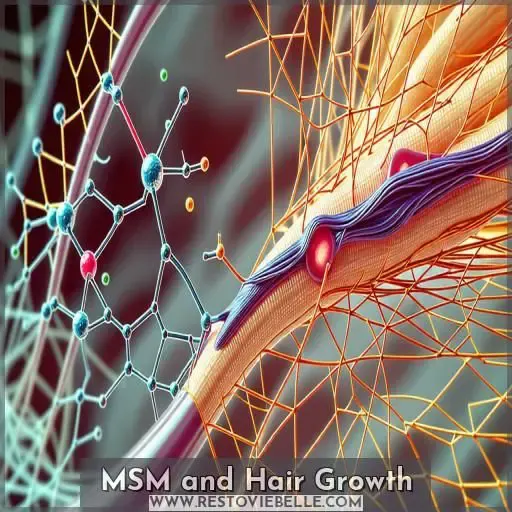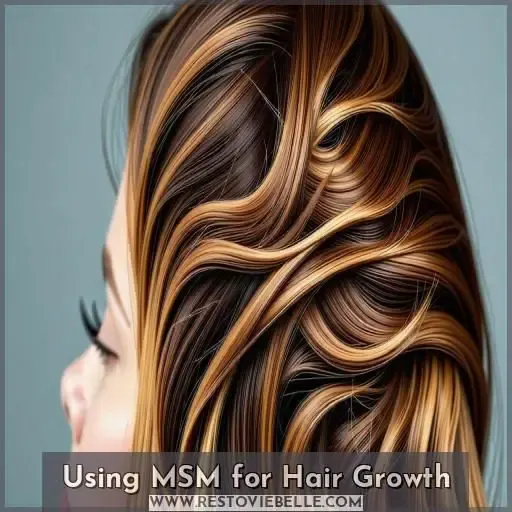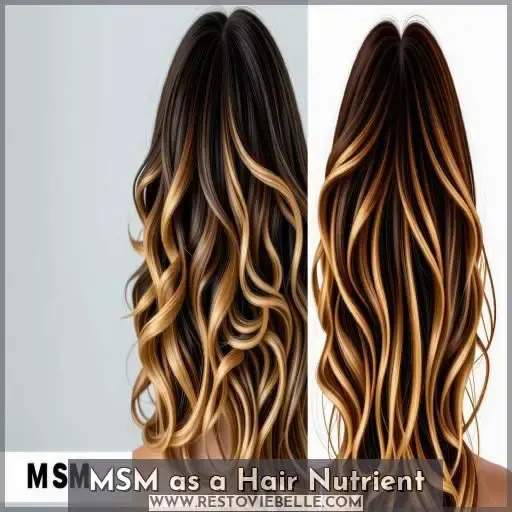This site is supported by our readers. We may earn a commission, at no cost to you, if you purchase through links.

MSM for hair growth might be the answer.
This anti-inflammatory sulfur compound strengthens keratin, nourishes follicles, and combats hair loss.
Studies on mice and humans show promising results, though more research is needed.
Give your tresses a boost with MSM supplements or powder – just 1-3 grams per day can do wonders.
But remember, consult with your doctor first to verify it’s right for you.
If you want to discover nature’s secret to a healthy, gorgeous mane, keep reading.
Table Of Contents
- Key Takeaways
- What is MSM?
- MSM and Hair Growth
- Using MSM for Hair Growth
- Food Sources of MSM
- Side Effects of MSM
- MSM as a Hair Nutrient
- Antioxidant and Anti-Inflammatory Properties
- Frequently Asked Questions (FAQs)
- Does MSM help hair growth?
- What is the downside of MSM?
- How long does it take for MSM to start working?
- Does MSM affect your hormones?
- Can MSM help regrow hair on bald spots?
- How long does it take for MSM to improve hair?
- Can MSM be used with other hair loss treatments?
- Is MSM safe for pregnant or breastfeeding women?
- How does MSM compare to other hair growth supplements?
- Conclusion
Key Takeaways
- MSM, or methylsulfonylmethane, is a naturally occurring sulfur compound with anti-inflammatory properties, often used in medicine.
- MSM supplements aim to address sulfur deficiency, supporting hair growth, thickness, and density.
- MSM has shown promising results in research studies for strengthening keratin, improving hair appearance, and enhancing hair condition.
- When using MSM for hair growth, it’s crucial to consult with a healthcare professional for personalized dosage recommendations and to explore verified supplements for quality assurance.
What is MSM?
MSM, or methylsulfonylmethane, is a naturally occurring sulfur compound found in plants, animals, and humans. With anti-inflammatory properties, MSM has been used to treat various conditions, making it a potential aid for promoting hair growth.
Definition and Properties
Methylsulfonylmethane (MSM) is a naturally occurring sulfur compound with anti-inflammatory properties, often used in medicine. It’s associated with strengthening keratin, promoting hair follicle health, and potentially preventing hair loss. MSM supplements aim to address sulfur deficiency, thereby supporting hair growth, thickness, and density. Understanding these properties is vital for harnessing the potential benefits of MSM for hair health.
Naturally Occurring Sulfur Compound
MSM, or methylsulfonylmethane, is a naturally occurring sulfur compound found in plants, animals, and even your own body. This organic sulfur plays a crucial role in maintaining healthy hair and preventing hair loss. By incorporating MSM into your hair care routine, you can reveal nature’s secret to luscious locks and enjoy the many benefits of this versatile supplement.
Anti-Inflammatory Properties
Methylsulfonylmethane (MSM) exhibits anti-inflammatory properties, essential for the scalp’s health and hair growth.
It aids in quenching free radicals and reducing inflammation, protecting hair follicles from damage.
These properties contribute to preventing hair loss, making MSM a valuable component for maintaining healthy hair.
When incorporated into hair care routines, MSM has the potential to enhance hair health and support natural growth while combating inflammatory processes .
Uses in Medicine
MSM’s versatility extends beyond hair growth, offering relief for various health concerns. Its anti-inflammatory properties make it a popular choice for managing joint pain and arthritis . Some studies suggest MSM may also alleviate allergy symptoms by reducing inflammation . When combined with biotin, another hair-friendly nutrient, MSM can create a potent hair growth supplement to boost your locks’ health and important .
MSM and Hair Growth
You’re interested in exploring the potential of MSM for promoting hair growth. Research studies have investigated the effects of MSM supplementation on hair in both mice and humans, with some promising results indicating it may strengthen keratin and improve hair appearance, though more thorough research is still needed.
Research on Mice
In a mouse model, MSM’s impact on hair growth was researched, revealing significant hair follicle expansion and higher VEGF levels, contributing to reduced oxidative stress and inflammation, which are linked to hair loss. This research supports MSM’s potential to enhance hair protein and shine. With promising findings in mice, further exploration in human models is essential to validate these observations .
Research on Humans
Exciting research shows MSM supplements can improve hair appearance.
A study found 3 grams of MSM daily enhanced hair condition.
Look for OptiMSM, verified by the United States Pharmacopeial Convention, to guarantee quality.
MSM’s anti-inflammatory properties may protect hair follicles.
Eat MSM-rich foods like alfalfa sprouts and leafy greens for an extra boost.
Consult your doctor before starting any new supplement regimen.
Strengthening Keratin
MSM’s sulfur-rich composition plays a significant role in strengthening keratin, the primary structural protein in hair. By enhancing collagen synthesis, MSM improves hair texture, elasticity, and overall health. Studies suggest MSM may stimulate hair growth and prevent male pattern baldness by nourishing hair follicles and promoting supple muscles that support healthy hair growth.
- Enhances collagen synthesis for stronger hair
- Improves hair texture and elasticity
- Nourishes hair follicles for great health
- May prevent male pattern baldness
- Promotes supple muscles for healthy hair growth
Need for More Studies
While initial studies show promise, more clinical trials are needed to fully understand MSM’s efficacy in promoting hair growth.
Future research should explore its effects on different hair types, long-term safety, and potential synergies with other treatments like minoxidil.
Larger sample sizes and placebo controls will help substantiate MSM’s benefits and uncover any side effects.
With further study, this natural compound could reveal the secret to luscious locks.
Using MSM for Hair Growth
One of the key advantages of using MSM for hair growth is that it has received GRAS (Generally Recognized as Safe) approval from the FDA, making it a safe and reliable option.
MSM is available in both supplement and powder forms.
However, it’s imperative to consult with a healthcare professional to determine the appropriate dosage and to explore purchasing supplements verified by the United States Pharmacopeial Convention for quality assurance.
FDA GRAS Approval
The FDA has GRAS-approved Methylsulfonylmethane (MSM) for hair growth, guaranteeing its safety and regulation. It’s available in various supplement and powder forms. However, the FDA hasn’t provided specific dosage regulations for MSM. Despite this, MSM is well-tolerated at dosages up to 4 grams daily and has been reported to be nontoxic, making it widely available for usage.
- GRAS approval guarantees safety and regulation (Source).
- Available in various supplement and powder forms.
- No specific FDA dosage regulations for MSM.
Supplement and Powder Forms
MSM is available in both supplement and powder forms for hair growth.
Supplements offer convenience, while powders provide flexibility in dosing.
Topical application of MSM powder may also benefit hair shaft integrity.
However, bioavailability and absorption may vary between oral and topical routes.
Consult with a healthcare professional to determine the most suitable dosage frequency and form for your individual needs.
Dosage Considerations
When using MSM for hair growth, aim for a dosage of 1-3 grams per day, as higher doses may not provide additional benefits . MSM is generally well-tolerated, but consult with your healthcare provider about potential interactions with medications or supplements you currently take . Long-term studies on MSM’s safety and efficacy for hair growth are still limited .
Consulting a Doctor
Before starting any new supplement regimen, it’s essential to consult with your doctor.
They can provide personalized dosage recommendations based on your individual health needs and goals.
While MSM is generally well-tolerated, it’s important to discuss any potential side effects or interactions with your current medications.
Your doctor can also advise on the safety of using MSM during pregnancy or breastfeeding and suggest alternative hair growth solutions if needed.
Verified Supplements
When considering supplement safety, it’s imperative to choose verified MSM products for hair growth potential.
Look for supplements verified by the United States Pharmacopeial Convention to guarantee quality and purity.
As with any supplement, consult a doctor for dosage recommendations and to discuss potential long-term effects and interactions with other medications.
Ensuring the safety and efficacy of MSM supplements is essential for achieving the desired results.
Food Sources of MSM
Although MSM is primarily available as a dietary supplement, you can also obtain this beneficial compound through various food sources. Common dietary sources of MSM include coffee, tea, milk, fruits like tomatoes and raspberries, leafy green vegetables, and whole grains.
Coffee and Tea
Enjoy your morning cup of coffee or tea? You’re in luck!
These beverages contain MSM, a natural compound that may stimulate hair growth.
The caffeine in coffee and tea acts as a vasodilator, increasing blood flow to the scalp and delivering essential nutrients to hair follicles.
Plus, the antioxidants in these drinks help protect hair from damage, promoting a healthy appearance.
Milk and Dairy
Milk and dairy products are excellent sources of MSM, providing a natural way to boost your hair’s health. However, those with dairy intolerance or lactose intolerance may need to explore alternative options. Dairy is also rich in calcium, which is essential for strong bones, and vitamin D, which enhances calcium absorption for strong hair growth.
Fruits and Vegetables
Fruits and vegetables like apples, raspberries, and leafy greens are rich sources of MSM, a sulfur compound beneficial for hair growth.
Including these foods in your diet can boost your sulfur intake, supporting the potential for enhanced hair growth when combined with MSM supplements or topical applications.
Make sure to have a balanced dietary intake to maximize the benefits of MSM for healthy hair.
Whole Grains
Whole grains are a fantastic source of MSM, providing a nutritious boost for your hair.
From fiber-rich oats to nutty brown rice, these complex carbs pack a punch of sulfur-containing amino acids.
Aim for at least three servings of whole grains daily to support hair health, but be mindful of any gluten sensitivity.
Enjoy the benefits of MSM from this delicious food group!
Side Effects of MSM
MSM is generally well-tolerated, with minimal side effects reported in most studies. However, some users may experience mild side effects such as headaches, nausea, abdominal discomfort, bloating, or diarrhea when taking MSM supplements, especially at higher doses or during initial use.
Minimal Side Effects
MSM is generally well-tolerated, with minimal side effects reported. Most users experience no adverse reactions at recommended dosages. However, some individuals may encounter mild discomfort like headaches, nausea, or abdominal issues. To minimize risks, always consult your doctor before starting MSM supplements. Stick to safe, verified sources for reliable hair growth benefits without compromising your health .
Possible Headaches, Nausea, Abdominal Discomfort
While MSM supplements are generally well-tolerated, some users may experience mild side effects like headaches, nausea, or abdominal discomfort (Source). To minimize these, start with a lower dosage and gradually increase as needed . If symptoms persist or worsen, discontinue use and consult your healthcare provider about alternative options that align with your individual needs and goals .
Avoiding Use During Pregnancy and Breastfeeding
During pregnancy and breastfeeding, it’s recommended to avoid MSM due to the lack of safety data in these specific populations. While MSM generally has minimal side effects, it’s imperative to prioritize the well-being of both the mother and the baby by refraining from its use during these sensitive periods to prevent any potential risks .
MSM as a Hair Nutrient
You’re likely familiar with the importance of sulfur for healthy hair growth. MSM provides a natural source of sulfur to support the synthesis of amino acids like cysteine and methionine, which contribute to hair’s strength and elasticity. Incorporating MSM into your hair care routine may enhance your hair’s overall condition, promoting stronger, more resilient strands.
Providing Sulfur for Amino Acids
MSM provides the sulfur needed for amino acids like methionine and cysteine, which are essential for hair follicle health and keratin production. By regulating amino acid metabolism, MSM supports the natural processes that drive hair growth. Incorporating this versatile compound into your hair care routine can help unleash your locks’ full potential.
Improving Hair Strength and Elasticity
MSM, a natural sulfur compound, strengthens your hair from within by providing essential amino acids like cysteine and methionine. These amino acids are the building blocks of keratin, the protein that gives your hair its strength and elasticity. By boosting keratin production, MSM helps prevent breakage and keeps your locks looking and feeling their best .
Enhancing Hair Condition
By providing sulfur, MSM supports the production of amino acids like methionine and cysteine, which are essential for hair strength and elasticity . Clinical studies show that MSM supplementation can considerably increase hair density and thickness, with over 80% of participants noticing improved hair volume and texture. Unleash your hair’s full potential with the power of MSM.
Antioxidant and Anti-Inflammatory Properties
MSM’s antioxidant properties enable it to quench free radicals, which can damage hair follicles and lead to hair loss. Its anti-inflammatory effects, achieved by inhibiting NF-kB and cytokines, protect the follicles from inflammation-induced damage, thereby preventing hair loss and promoting healthy hair growth.
Quenching Free Radicals
Methylsulfonylmethane (MSM) exhibits powerful antioxidant capacity, effectively quenching free radicals that can harm hair follicles. This natural sulfur compound helps protect the scalp and hair from oxidative stress. By providing sulfur, MSM addresses potential sulfur deficiency that could affect hair health. The antioxidant properties of MSM play a key role in maintaining the strength and resilience of your hair.
Reducing Inflammation
MSM’s anti-inflammatory properties make it a powerful ally against oxidative stress, a leading cause of hair loss. By inhibiting inflammatory pathways like NF-kB and cytokines, MSM helps maintain a healthy scalp environment, promoting vigorous keratin synthesis and follicle health. Incorporating MSM into your routine can help you achieve the luxuriant locks you desire.
Protecting Hair Follicles
MSM’s role in protecting hair follicles lies in its potent antioxidant and anti-inflammatory properties.
By quenching free radicals and reducing inflammation, MSM safeguards hair follicles from damage caused by oxidative stress and inflammatory processes.
These mechanisms can help prevent hair loss and promote long-term hair health.
Additionally, research has demonstrated the potential clinical applications of MSM in maintaining hair growth and countering the impact of DHT, leading to positive long-term effects.
Preventing Hair Loss
MSM’s antioxidant and anti-inflammatory properties are key to preventing hair loss. By quenching free radicals and reducing inflammation, MSM protects hair follicles from damage. This helps improve hair texture, enhance shine, reduce scalp irritation, thicken strands, and promote healthy growth. Incorporating MSM into your routine can reveal the secret to luscious locks by stopping hair loss in its tracks.
Frequently Asked Questions (FAQs)
Does MSM help hair growth?
Picture your flowing locks, vibrant and strong. MSM, a natural sulfur compound, may just make that dream a reality. Studies suggest it could fortify hair strands and promote growth – nature’s secret to revitalizing your crowning glory.
What is the downside of MSM?
One downside is that MSM may cause mild side effects like headaches, nausea, or digestive issues in some people. It’s also advised to avoid MSM during pregnancy or breastfeeding due to lack of research.
How long does it take for MSM to start working?
Like watching grass grow after rainfall, MSM results take patience – 3 to 6 months for noticeable improvements. Consistency is key: follow dosage guidelines precisely for maximum efficacy.
Does MSM affect your hormones?
MSM doesn’t affect your hormones. It’s a natural sulfur compound that supports hair growth by reducing inflammation and oxidative stress in the scalp. No need to worry about any hormonal imbalances when taking MSM supplements.
Can MSM help regrow hair on bald spots?
Yes, MSM may help regrow hair in bald spots. Studies show it strengthens keratin in hair follicles and boosts growth factors, promoting new hair growth over time.
How long does it take for MSM to improve hair?
You should start noticing improved hair appearance within 3-4 months of consistently taking MSM supplements. Be patient, as it can take time for the benefits to become visible.
Can MSM be used with other hair loss treatments?
MSM pairs nicely with other hair loss treatments like minoxidil—combining them supercharges results, promoting robust hair growth through complementary mechanisms.
Is MSM safe for pregnant or breastfeeding women?
You should avoid taking MSM supplements when pregnant or breastfeeding due to insufficient safety research. Consult your doctor before using any supplements during these delicate periods.
How does MSM compare to other hair growth supplements?
While MSM’s efficacy needs further research, it hits the nail on the head by addressing hair loss from within – nourishing hair with sulfur, an antioxidant punch against inflammation and follicle damage.
Conclusion
Coincidentally, if you’re seeking a natural ally for luscious locks, MSM for hair growth is worth exploring.
This sulfur-rich supplement strengthens keratin, nourishes follicles, and fights inflammation – key factors in combating hair loss.
While more research is needed, current studies show promising results.
Consult your doctor, then consider supplementing with 1-3 grams daily for a potential boost to your mane’s health and radiance.













